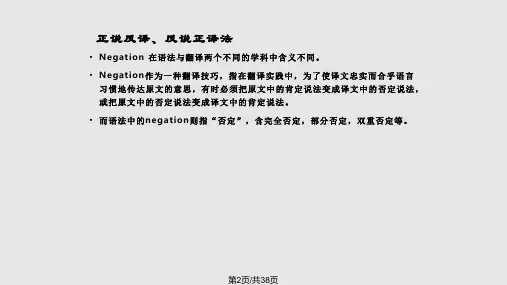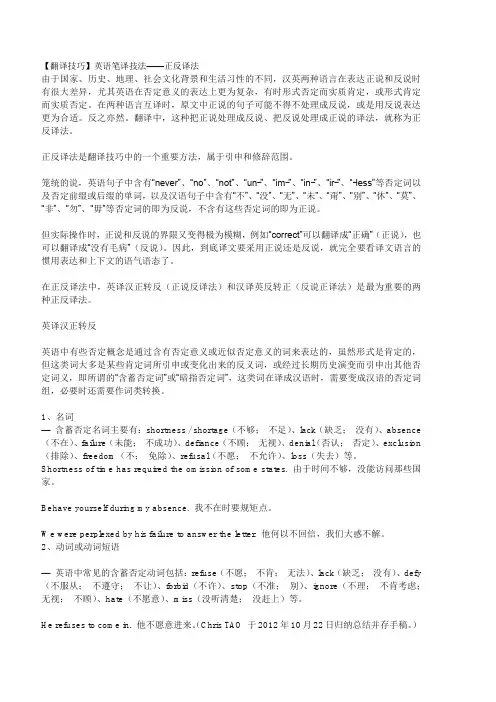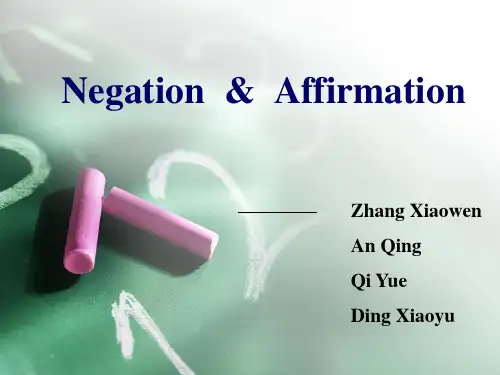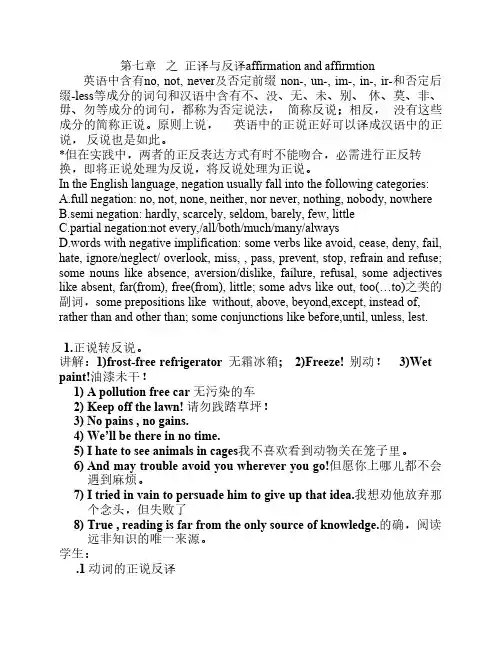第七节正反译法
- 格式:doc
- 大小:27.00 KB
- 文档页数:2






【翻译技巧】英语笔译技法——正反译法由于国家、历史、地理、社会文化背景和生活习性的不同,汉英两种语言在表达正说和反说时有很大差异,尤其英语在否定意义的表达上更为复杂,有时形式否定而实质肯定,或形式肯定而实质否定。
在两种语言互译时,原文中正说的句子可能不得不处理成反说,或是用反说表达更为合适。
反之亦然。
翻译中,这种把正说处理成反说、把反说处理成正说的译法,就称为正反译法。
正反译法是翻译技巧中的一个重要方法,属于引申和修辞范围。
笼统的说,英语句子中含有“never”、“no”、“not”、“un-”、“im-”、“in-”、“ir-”、“-less”等否定词以及否定前缀或后缀的单词,以及汉语句子中含有“不”、“没”、“无”、“未”、“甭”、“别”、“休”、“莫”、“非”、“勿”、“毋”等否定词的即为反说,不含有这些否定词的即为正说。
但实际操作时,正说和反说的界限又变得极为模糊,例如“correct”可以翻译成“正确”(正说),也可以翻译成“没有毛病”(反说)。
因此,到底译文要采用正说还是反说,就完全要看译文语言的惯用表达和上下文的语气语态了。
在正反译法中,英译汉正转反(正说反译法)和汉译英反转正(反说正译法)是最为重要的两种正反译法。
英译汉正转反英语中有些否定概念是通过含有否定意义或近似否定意义的词来表达的,虽然形式是肯定的,但这类词大多是某些肯定词所引申或变化出来的反义词,或经过长期历史演变而引申出其他否定词义,即所谓的“含蓄否定词”或“暗指否定词”,这类词在译成汉语时,需要变成汉语的否定词组,必要时还需要作词类转换。
1、名词—含蓄否定名词主要有:shortness / shortage(不够;不足)、lack(缺乏;没有)、absence (不在)、failure(未能;不成功)、defiance(不顾;无视)、denial(否认;否定)、exclusion (排除)、freedom(不;免除)、refusal(不愿;不允许)、loss(失去)等。



第七章之正译与反译affirmation and affirmtion 英语中含有no, not, never及否定前缀non-, un-, im-, in-, ir-和否定后缀-less等成分的词句和汉语中含有不、没、无、未、别、休、莫、非、毋、勿等成分的词句,都称为否定说法,简称反说;相反,没有这些成分的简称正说。
原则上说,英语中的正说正好可以译成汉语中的正说,反说也是如此。
*但在实践中,两者的正反表达方式有时不能吻合,必需进行正反转换,即将正说处理为反说,将反说处理为正说。
In the English language, negation usually fall into the following categories:A.full negation: no, not, none, neither, nor never, nothing, nobody, nowhereB.semi negation: hardly, scarcely, seldom, barely, few, littleC.partial negation:not every,/all/both/much/many/alwaysD.words with negative implification: some verbs like avoid, cease, deny, fail, hate, ignore/neglect/ overlook, miss, , pass, prevent, stop, refrain and refuse; some nouns like absence, aversion/dislike, failure, refusal, some adjectives like absent, far(from), free(from), little; some advs like out, too(…to)之类的副词,some prepositions like without, above, beyond,except, instead of, rather than and other than; some conjunctions like before,until, unless, lest.1.正说转反说。
第七节:正反、反正表达法(Negation)
1. Our PLA is worthy of being called a great army of the people.
2. He tries his best to overcome the lack of technical data.
3. The window refuses to open.
4. Yesterday he failed to get to school on time.
5. They excluded children (from) getting in.
6. That building is in a state of neglect.
7. He’s often absent-minded.
8. Lei Feng’s noble deeds are above all praise.
9. I, rather than you, should do the work.
10. The truth is quite other than what you think
11. Live up to the expectations of our own people and the people throughout the world.
12. Slips are scarcely avoidable when you’re new to your work.
13. There are two aspects to everything; to say there is only one is to be aware of one aspect and to be ignored of the other.
14. In technology, I think first we have to follow others in most cases, and it is better for us to do so, since that is what we are lacking at present and know little about.
15. The meeting were marked by such an absence of lively discussions that at times they were almost on the point of breaking up.
16. The scientists made a solemn pledge at the conference, saying,“We’ll for ever live up to what our Party expects of us.”
17 The County Party Committee there is ignorant of conditions at the lower levels.
18 The fellow is far from being honest.
19 The city and the areas around it are an ice-free port and a nuclear-weapon-free zone.
20 He stood still, trying vainly (in vain) to answer the battery of questions the boss raised.
21 The world today is far from peaceful.
22 She refrained from laughing.
23 She was refused admittance by them.
24 The evidence is conclusive, excluding all possibilities of doubt
25 Mr. White has refrained from making any official comment on the coup in that country.
26 That served to strengthen instead of weaken our determination (or: That strengthened, rather than weakened, our determination.)
27 But for the workers’ help, we should not have succeeded in this experiment.
28 The first bombs missed the target.
29 Such a chance was denied me
30 This problem is beyond me.
31 When Philip missed the last bus, he was at a loss to know what to do.
32 He unfastened his shoelace.
33 I rode around with him one day seeing how the ships unloaded.
34 Many agreed that the Prime minister had in effect resigned dishonorably.
35 He was an indecisive sort of person and always capricious.
36 It was said that someone had sown discord among them.
37 He manifested a strong dislike for his father’s business.
38 Don’t lose time in posting this letter
39 The significance of these incidents wasn’t lost on us.
40 Such flights couldn’t long escape notice.。